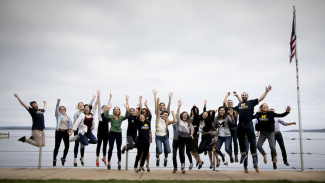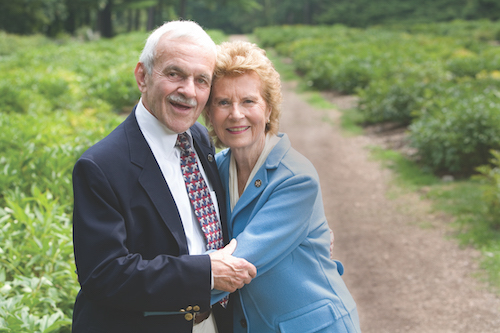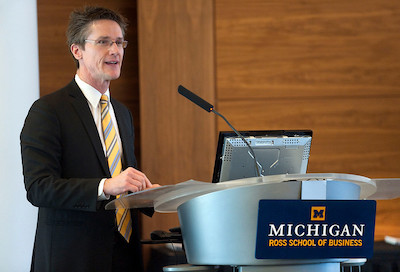The Erb Institute: 25 Years of Advancing Business Sustainability

What does sustainability in business mean today, and what does it look like going forward? For the past 25 years, the Erb Institute has been at the forefront of redefining sustainability, and it looks forward to continuing to do so for the next 25.
Looking back
In 1996, the Frederick A. and Barbara M. Erb Environmental Management Institute was founded as a joint venture between the Ross School of Business and the then-School of Natural Resources and Environment (now the School for Environment and Sustainability).
At that time, most businesses’ attention to sustainability focused narrowly on environmental challenges. Chief sustainability officers didn’t exist yet, and companies’ consideration of their environmental footprint was typically limited, if they considered it at all.
 “Fred and Barbara were way ahead of their time in sponsoring and funding the Erb Institute. They believed that business needed to play a strong role in bettering their environmental performance and impact,” said Neil Hawkins, president of the Erb Family Foundation. At the time, that was revolutionary, he said.
“Fred and Barbara were way ahead of their time in sponsoring and funding the Erb Institute. They believed that business needed to play a strong role in bettering their environmental performance and impact,” said Neil Hawkins, president of the Erb Family Foundation. At the time, that was revolutionary, he said.
Fred and Barbara Erb, who met at the University of Michigan, saw a way to bring together business and environmentalism. John Erb, chairman of the Erb Family Foundation, said about Fred, his father: “Even though business was his passion, he also was very concerned about the environment and the planet that was being left to future generations. My mother and my father had a deep love of the natural environment.”
The Erb Institute had seven graduates in 1996, and now, more than 500 have graduated with dual MBA and MS degrees from Ross and SEAS, respectively.
What business sustainability means now
The Erb Institute has been at the forefront of broadening the scope of sustainability beyond the environment to include social issues, such as community investment, employee engagement, human rights, and diversity and justice.
“In the recent decade, the focus on social issues, environment and business has grown,” said Associate Professor Sara Soderstrom, an Erb faculty member. “Currently, a specific consideration of justice is gaining more — and needed — attention, especially as we consider the inequitable impacts of climate change and the potential for business to amplify or address these impacts.”
More businesses now have sustainability embedded within their core business models, long-term strategies, and daily operations. Leaders recognize it as essential to the business, rather than a separate division or a side project.
“Twenty-five years ago, we were fighting to get these issues on the table,” said Sangeeta Ranade, vice president of Distributed Energy Resources at the New York Power Authority and a 2001 Erb alum. “Now, you see capital flowing into clean energy projects and related businesses.”
The Erb Institute’s mission is to create a socially and environmentally sustainable world through the power of business. This happens through teaching, research, and business engagement — equipping future leaders with the knowledge and skills they need to advance business sustainability.
Education: The dual-degree graduate program prepared 2020 alum Madeleine Carnemark to “speak to business problems while also applying an environmental lens,” she said. “A lot of what we did at SEAS is bottom-up research, and so much of business school is top-down. Seeing if you can really lean into that dissonance and explore it” has been invaluable, said Carnemark, now an associate at McKinsey.
The institute provides extensive outside-of-the-classroom learning experiences, including Erb on the Road, a three-day immersion course that takes students to businesses, nonprofits, and other organizations across Michigan to learn directly from them.
Last year, the Erb Institute launched the undergraduate Erb Fellows program to deliver business and sustainability education, community, and co-curricular learning to Ross BBA and Program in the Environment students. This program is the first of its kind at U-M, and 73 fellows are currently enrolled.
Undergraduates have long been demanding these sorts of opportunities, said Claire Haase, a current undergraduate Erb Fellow: “It's representative of the organic, growing interest that my generation is having in these issues.”
Research and business engagement: The institute conducts both scholarly and applied research, and it partners with businesses to help them tackle their most pressing challenges. For example, Partnership Projects pair companies and nonprofits with students to launch tailor-made projects. Erb’s Sustainability Academy executive education program helps executives transform and rethink business models, strategy, and operations for long-term social and environmental sustainability.
“The Sustainability Academy provided a very strong platform to create cohorts of intrapreneurs to spur innovation within a single company (Dow), and these leaders became powerful change agents within their functions and businesses,” said Hawkins, who previously served as Dow’s CSO.
Another area of innovation is corporate political responsibility: Firms need to become more transparent about their political activity, argues Erb Faculty Director Tom Lyon. But many executives lack an integrated view of their firms’ political engagement. The institute has convened a Corporate Political Responsibility Taskforce to help companies respond to these challenges.
Looking ahead
Business sustainability has made strides, but in its current form, it will not solve the root causes of the problems at hand, argues Ross Professor Andy Hoffman. Business must transform the market, and this market transformation is the next phase of business sustainability. The institute will continue to focus on market transformation moving forward, and its forthcoming five-year strategic plan lays out its vision for how it intends to help realize this transition.
 Erb Institute Managing Director Terry Nelidov is looking ahead to the institute’s 2021-25 strategy. “We just completed a series of roundtables with senior business and nonprofit leaders around the globe to provide input to our next strategic plan,” he said.
Erb Institute Managing Director Terry Nelidov is looking ahead to the institute’s 2021-25 strategy. “We just completed a series of roundtables with senior business and nonprofit leaders around the globe to provide input to our next strategic plan,” he said.
“Their message was loud and clear! If we really believe that this is the ‘decisive decade’ for sustainability action, then we need to think big and bold about business transformation and how to prepare the next generation of business people to lead the charge.”
“By being at the forefront of sustainability-focused research, engaging with hundreds of students in the classroom, connecting diverse stakeholders in scaling our knowledge, and supporting networks of alumni, stakeholders, and students, the Erb Institute is uniquely situated to scale local impact globally, amplifying our expertise and supporting each other to mobilize for change,” Soderstrom said.
The Erb Institute will continue to spark these conversations, equip leaders to confront tough challenges, and help develop solutions that will keep pushing sustainability forward — for the next 25 years and beyond.







